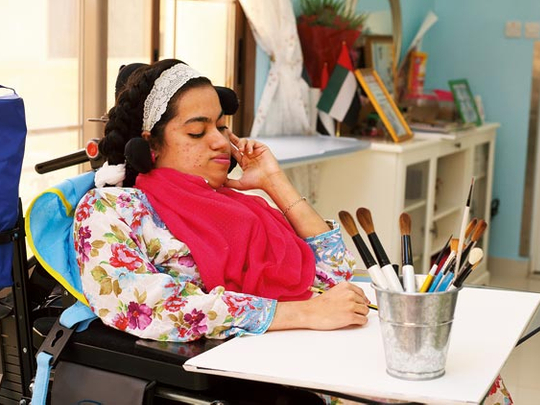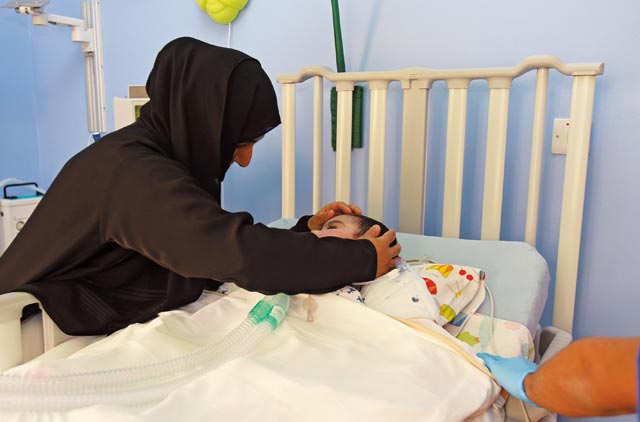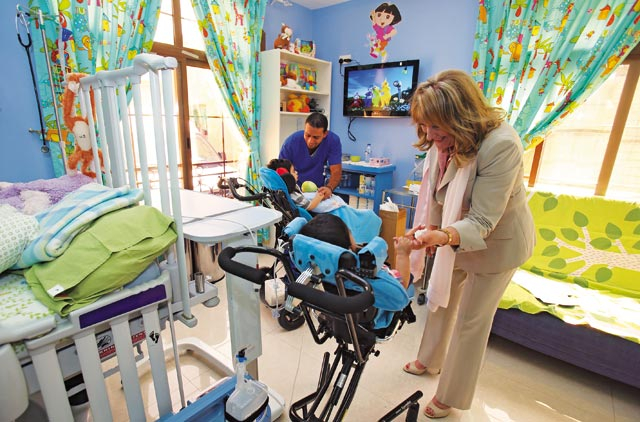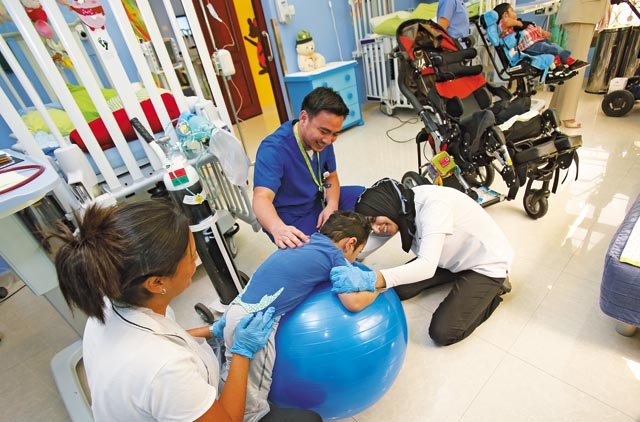
Yusra Al Hathali, brush in hand, is bent over a sheet of paper, deep in concentration. She is perfecting the orange shape she has just painted to resemble the sun. The room is silent, save for the gentle swishing sound of the air she is taking in through the plastic pipe of her ventilator.
Seated in a specially equipped wheelchair – as she is suffering from debilitating motor neurone disease that has led to chronic respiratory failure – Yusra, 26, lifts her head to look at her work from a new perspective.
A hint of a smile develops before she shyly shows Friday her artwork, then picks up her mobile phone and types out a message in Arabic: “One day I’ll open an art studio.” Her excitement is palpable when we praise her work, although she is unable to speak because of the tubes in her lungs.
Yusra has been struggling with her disease, which caused progressive muscle weakness and wastage, since she was just a baby and requires long-term medical attention. She moves around in a motorised wheelchair, has to be fed through a special tube and is assisted in breathing by the ventilator, with only a couple of hours’ break from the machine each day. The genetic condition has left her a paraplegic and she can move only her forearms and fingers.
Until last year, Yusra was confined to a bed in an Abu Dhabi hospital’s intensive care unit where she was cared for around the clock. She had little social life and apart from doctors and nurses, the only people she saw were her family. Her condition prevented her from following her passion and studying art. But that changed when the ProVita International Medical Centre opened its doors in Khalifa City and Yusra became one of its first patients.
An internationally run facility for Emiratis, it’s a first of its kind in this country and provides long-term care for patients who need regular medical, nursing and rehabilitatory intervention. It does this in a non-hospital setting, with three physiotherapists, two occupational therapists and four respiratory therapists making up the staff. Six two-storey villas have the capacity to house six patients each. At the moment there are 34 patients, 22 of whom are infants.
Among those offered a place are toddlers with delayed development and brain damage, victims of road accidents, geriatric patients and those suffering from muscular dystrophy and motor neurone diseases.
An idea takes shape
Christina Shawky-Boehme, a qualified nurse who personally supervises the running of the centre, established the Abu Dhabi facility after she was asked to care for an invalid patient on a ventilator at his home in Munich, Germany. Thanks to quality care, the patient went on to live for 11 years.
“Until then, few believed that a person on a ventilator could be taken care of outside an ICU,” she says.
“When patients are so ill they cannot breathe or eat independently, or cannot move without assistance, usually the practice is to put them in ICU where touch screens attached by tubes to their bodies give us a complete report of their physiological conditions and they continue to breathe and be fed with assistance by nurses and other care staff. However, I felt such patients could recover best in a home-like care centre or at home where they have a chance to be treated like individuals and have the opportunity to realise some of their dreams and desires.
“With a combination of occupational therapy, physiotherapy and psychotherapy, I was able to wean the patients off the ventilator for a few hours a day, get them to move around in custom-designed wheelchairs, which gave them better muscle tone, and also get them to communicate in some way with staff and family members. This way, they had a chance of a better quality of life.’’
When patients under this kind of programme got better, Christina realised her model was successful and she went on to establish 14 centres in Germany.
Banishing monotony
“This concept gives patients who cannot live independently the chance to lead their lives better, meet friends, siblings, parents, members of the extended family and be treated like adults,” says Christina. “Some of the patients are able to sit for tests or examinations or do some sort of intellectual activity such as painting, playing a musical instrument or whatever is possible to take away the monotony of their existence.’’
And that is exactly what Yusra and several other patients experience. Last month for instance, Yusra received a pleasant surprise when she was wheeled into a party tent erected at the facility where family members, staff and some of her close friends had gathered to be with her on her 26th birthday.
Smiling and with a sparkle in her eyes, the young woman cut her birthday cake before watching some programmes on TV with her family. “It was truly one of the more memorable days here. We could all see just how happy Yusra was,’’ says Samira Hanif, a staff member.
Thanks in large measure to their care, Yusra’s life has been enriched dramatically. She is active on social media sites, keeping in touch with her friends and family members on her laptop. She loves art and enjoys painting and sketching almost all through the day. Recognising her passion for painting, ProVita even arranged for an art teacher to visit her once a week. On top of that, Yusra successfully completed her International Baccalaureate certification in Business Management this year.
Every morning, Yusra is wheeled outdoors so she can enjoy fresh air and the winter sunshine and admire the perfectly manicured lawns and gardens. And every week she is taken to a shopping mall in her wheelchair to indulge in some retail therapy.
The joy of being treated as an individual and getting the chance to choose what to do has not only improved Yusra’s self-esteem, but given her great hope. For the first time, she looks forward to a new day, planning her schedule.
Revisiting passions
In another room Abdul Rahman (name changed on request), who is being weaned off the ventilator for a couple of hours every day, is giving his lungs a much-needed workout. Abdul, 40, suffered irreparable damage to his spinal cord in a road accident last year, which left him a quadriplegic. A lover of adventure and action, it has taken Abdul a while to get used to his condition. “The caregivers have been working hard to bring a degree of normalcy to his life,’’ says Samira.
Although he is in a wheelchair, Abdul last month asked to be taken on a fishing trip – an activity he used to indulge in regularly before his accident. Arrangements were promptly made and Abdul was overjoyed when he was taken on to a boat and given a fishing rod. Although he was unable to hold it because of his condition, he asked the nurses just to place it in his hands. “The joy on his face was unforgettable,’’ says Christina.
But it’s not just adults who benefit from the facility. Villa No 2 on the campus has a large occupational therapy room for children. Here little ones like Mohammad Obaid, who has muscular atrophy, are treated to improve their condition. This three-year-old has very poor muscle tone, can hardly stand on his own, speak or socialise and is largely dependant on the ventilator for his breathing.
Now, after undergoing rigorous therapy he is able to stand a little and tries to make some eye contact with staff and family.
The patients’ family members are all happy to see an improvement in the quality of life of their loved ones at the centre.
“I am so happy that my son is being cared for so well here. I love him but I could not have given him the 24/7 quality care he gets here,” says May Daheri, mother of 18-month-old baby Saeed who suffers from spinal muscular atrophy, an inherited and debilitating disease where muscles waste away. Saeed cannot move or breathe without ventilator assistance.
For May, who has two other sons, the facility is a welcome relief as she can divide her time between her home and this centre.
“I am very glad that ProVita is taking such good care of Saeed,” she says. “I try to spend a lot of time with him in the morning when my other two boys are at school, but I have to go back to my family to take care of the others. When I leave here, I know he is in safe hands.”
Rewarding work
Taking care of the patients at the facility is a demanding and rewarding job. At 7am the night staff hand over the patients to the day-care nurses. Patients who can be transferred into wheel chairs are taken out of their rooms for some fresh air.
Only two of the 34 patients at the facility can eat food, the rest are fed through tubes. Care is taken to ensure that the diet is balanced and suited to their needs.
A typical morning is divided into therapy time, music time, home and mall visits along with check-ups at hospital.
Mid-afternoon is reserved for visits from guests and family. Patients can also watch movies in the entertainment tent erected on the campus. The success of the facility has prompted ProVita to look at adding an additional 24 beds to the current campus, and also to open a new 50-bed facility at Al Ain in early 2013.
Returning home
For many patients, the centre is a permanent home as they are on ventilators that require professional management. However, there have been several instances where patients have been able to get off ventilators and breathe on their own. These patients have returned to their homes, says Christina.
An example of one of these successes is baby Shaikha who was weaned off the ventilator and was able to travel to the US for further treatment. The four-year-old was admitted to ProVita over a year ago to receive treatment for a congenital disorder called tracheomalacia, a weakening of the trachea that prevents her from eating, breathing or speaking normally.
She underwent several corrective surgical procedures in the UAE and overseas and was admitted to the centre at the age of two. Through daily therapy sessions and round-the-clock care, her condition improved.
After being weaned off mechanical ventilation, she was able to walk, first with support and then unaided for short distances. Shaikha is now able to engage in independent activities and is at a stage where she can be enrolled into a basic education programme, a milestone that those close to her never expected her to reach.
Meanwhile Yusra, who’s taken a short break to rest, returns to her painting, adding a river and a few trees. She flashes us a smile as we prepare to leave. Her mobile phone still displays the message she typed out earlier: “One day I’ll open an art studio”. Christina looks at her with pride. “I’m sure she will be able to. We are looking forward to more such patients being able to live a life of dignity.’’
Making a Difference
What: ProVita International
Where: Abu Dhabi
How: Giving patients with life-threatening conditions a better quality life














